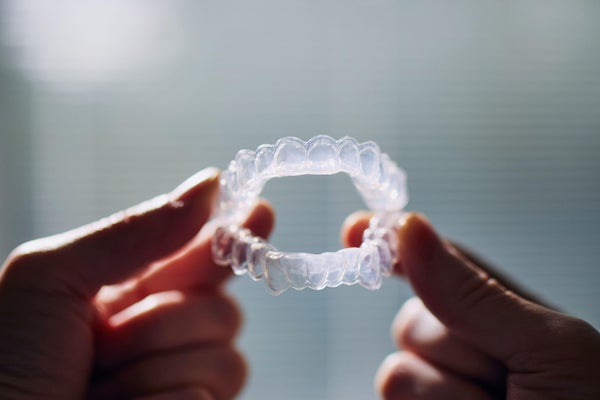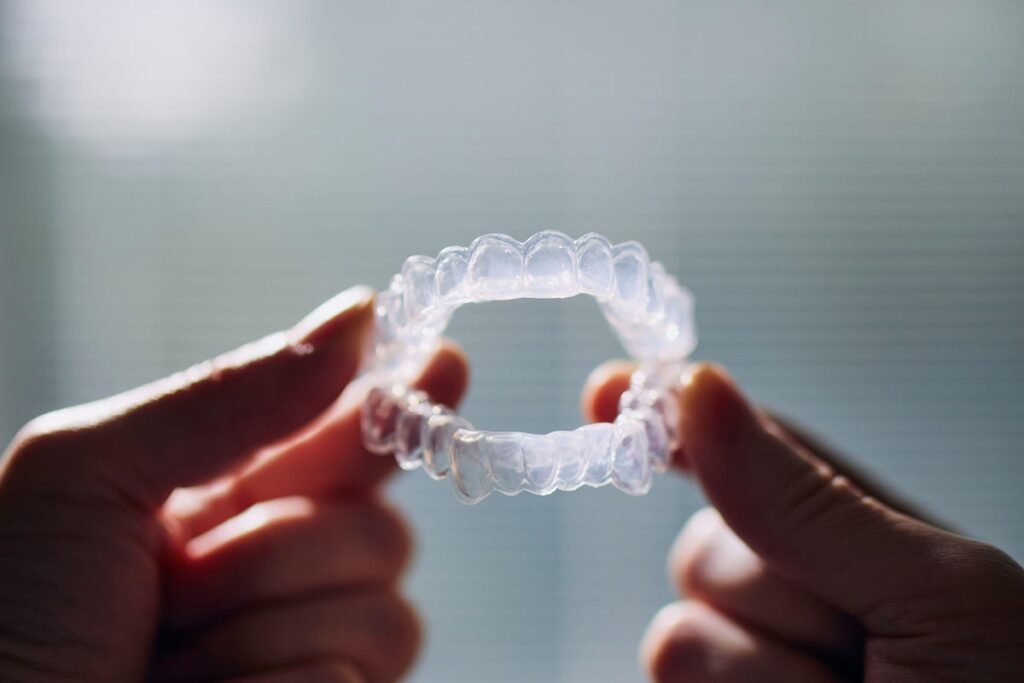[ad_1]
December 2, 2024
3 min read
Too Much Teeth Whitening Can Cause Damage. Here’s What to Know
Using teeth-whitening treatments to achieve a brighter smile may be appealing, but experts say overdoing it could cause lasting damage

Teeth-whitening trays are one of the many types of popular at-home teeth-whitening products on the market.
Jaromír Chalabala/Alamy Stock Photo
Flashing a gleaming set of pearly whites may feel glamorous, but people who are overzealous with using popular teeth-whitening treatments can seriously endanger their oral health. TikTok and Instagram influencers are hawking any number of novel over-the-counter whitening products, and celebrities’ typically snowy-white teeth can make the rest of us feel self-conscious about our own smile. And in a 2022 survey, nearly half of dentists said they use social media to advertise aesthetic treatments.
“Patients want it so white that it looks unnatural,” says Ronald Perry, a professor of comprehensive care at the Tufts University School of Dental Medicine. He first noticed an increased interest “with social media, and then [it] blossomed during the pandemic. People started to see their teeth over Zoom and think they looked yellow.”
About 37 million Americans tried some form of teeth-whitening product or procedure in 2020. The wide assortment of over-the-counter treatments include gel-filled trays, strips and pens—while dentists can use a potent bleaching gel and lasers. Experts say using over-the-counter products in accordance with manufacturers’ guidelines is generally safe, but they warn that overdoing it can be costly for your teeth: overwhitening can damage enamel, burn gums, cause long-term tooth sensitivity or even bleach out so much natural color in teeth that they turn translucent.
On supporting science journalism
If you’re enjoying this article, consider supporting our award-winning journalism by subscribing. By purchasing a subscription you are helping to ensure the future of impactful stories about the discoveries and ideas shaping our world today.
Most over-the-counter treatments use the same active ingredient: hydrogen peroxide. It starts an oxidation reaction that removes discoloration on and below a tooth’s surface—and in doing so it makes the enamel more permeable or even porous, according to a 2015 study in the European Journal of Dentistry. Additionally, a 2018 Dentistry Journal study found that directly exposing teeth to bleaching agents, including hydrogen peroxide and carbamide peroxide, can lead to uncomfortable sensitivity in the nerve-riddled dentin (the rigid yellow tissue that makes up much of a tooth’s internal structure and blankets the nerves). And as the enamel layer degrades, the dentin itself can eventually become visible—entirely defeating the treatment’s purpose. “What we end up seeing is the underlying, more yellowish dentin,” says Stephen Sterlitz, chief of the restorative dentistry division at the University of Kentucky. “And at the edges of the teeth, where there’s no dentin, it looks like glass.”
Damage from occasional bleaching applications isn’t usually permanent because saliva contains a small amount of electrolytes, including phosphate and calcium, that can help remineralize teeth. Foods such as dairy products, dark leafy greens and fish also contain some teeth-strengthening minerals, and toothpastes with fluoride and hydroxyapatite can fortify enamel. But people who consistently overuse whitening products can develop long-term tooth sensitivity or even significant tooth erosion, says Nadia Rodriguez, a cosmetic dentist in New York City. Hydrogen peroxide in whitening treatments can chemically burn the gums, particularly if products aren’t applied correctly.
So how white can your teeth safely get? That depends on how much enamel you start with. “A younger person tends to have more enamel, which means their teeth can get whiter than an older person’s,” Rodriguez says. Whitening your teeth to a shade just slightly whiter than the whites of your eyes is typically considered best practice, she says.
Moderate teeth whitening is safe and effective, Perry says. Overall, the data show that professional whitening done at a dentist’s office is generally harmless, as long as people wait at least six months to a year between sessions. Some tooth sensitivity is a common side effect, but it usually fades a few weeks after treatment. Most at-home whitening kits are also considered safe if users follow the manufacturer’s guidelines. Many such treatments should only be applied for up to two weeks, and Rodriguez advises waiting three to four months before whitening again (at-home treatments contain a lower percentage of hydrogen peroxide than in-office treatments).
Having white teeth can make people feel more presentable and confident. But Rodriguez warns that those flashy smiles advertised on social media are often selling a false narrative. “When people have absurdly white teeth on social media, it’s [likely] not their real teeth,” she says. The look may be enhanced by social media filters or achieved through porcelain coverings, called veneers, which can cover any imperfections or stains.
For most of us who want brighter teeth, Perry contends that the routine dental health basics are a good place to start and may be enough. “Before you do anything else, get a professional cleaning to remove hardened plaque, tartar and a large amount of staining from your teeth,” he says. And only then decide whether additional whitening still makes sense for you.
[ad_2]
Source link

